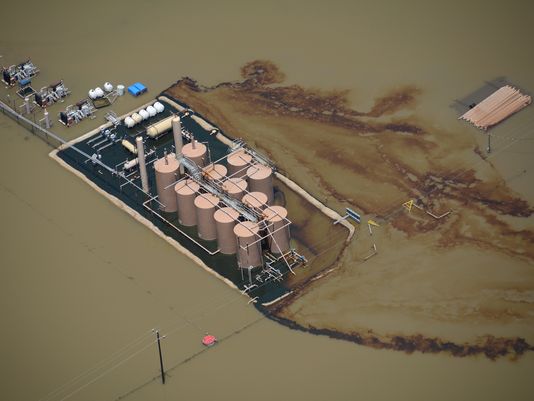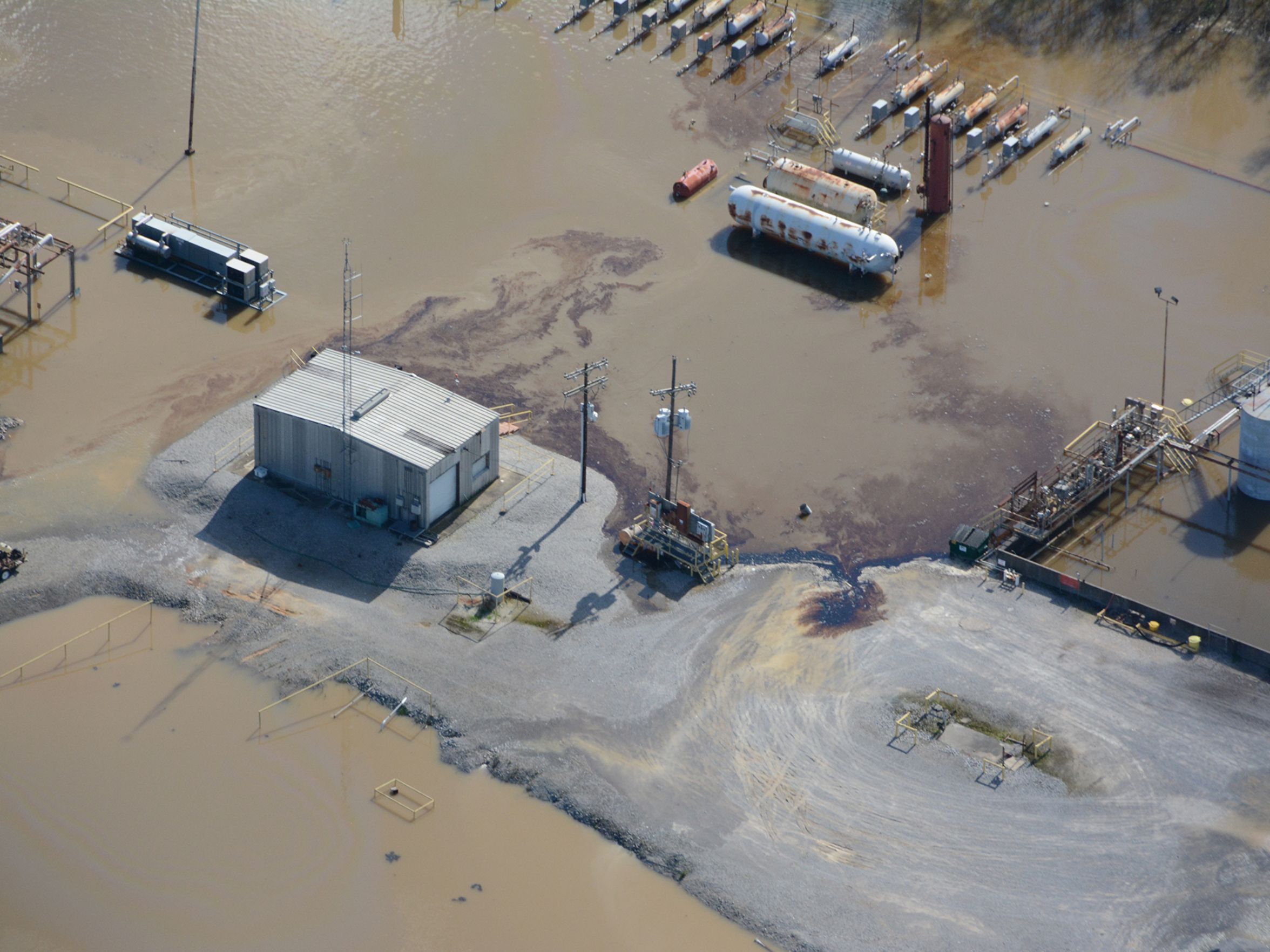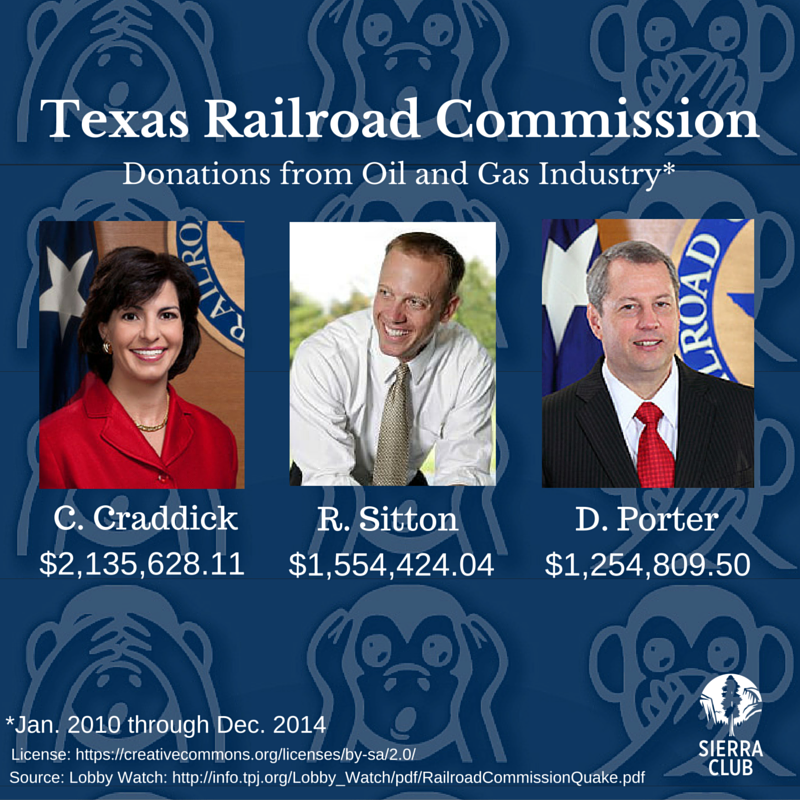By Cyrus Reed, Olka Forster
Edited by Matt Johnson
If you read our blog often, you likely already know that the Railroad Commission (RRC) of Texas does not regulate railroads. What you may not know is that this state agency, tasked with regulating oil and gas facilities, intrastate pipelines, coal mines, and uranium exploration among other energy-related activities, is facing its third legislative review in 10 years.
Despite a chronic need for reform, this review, like the last two, could easily result in little to no substantial change of the agency. If no reform bill is passed and signed by Governor Abbott, Texas will continue to suffer the bad actors in our state's fossil fuel industry. Will this time round be different? We hope so and are working hard for meaningful changes that will protect the health, safety, and environment of the Lone Star state and its people.
Where to Start?
The Railroad Commission of Texas needs much more than a name change and you can help us get it. Please take action and let the Sunset Commission know you support fundamental changes in the way Texas regulates oil and gas. The chances to change things are already running out even though the Legislature hasn’t even started. Decisions are being made right now.
Fortunately, there are many opportunities for Sierra Club members and supporters to make the case for cleaning up the Railroad Commission. On October 6, the Legislative Budget Board, the body responsible for writing the state’s initial budget for the upcoming two-year period, held a hearing that included the RRC budget. The Sierra Club was there to tell the body exactly what was needed.
Show Me The Data
One of the issues on which both the Sierra Club and the Sunset Commission staff agree is the Railroad Commission’s broken enforcement regime. There is no question that the RRC can and must do better at making its enforcement and complaint data more accessible to the public. Back in 2011, the Legislature provided an additional $16 million to the RRC to update its systems and make information more accessible. One of their efforts was to improve the technology for inspections and enforcement so different entities could communicate better, it is still incomplete and public access to enforcement data is spotty at best.
What To Do
The Legislature must provide direction and funds to put inspection, enforcement, and complaint data online and ensure it is accessible and searchable. The public should be able to search by operator, pipeline company, and by well.
To make this useful, the RRC has to address two key components: inspection and enforcement.
More Inspectors Needed... Now
The Sierra Club actually agrees with the Railroad Commission on its lack of inspectors. We know a large number of wells routinely violate their permits, spills occur at wastewater disposal wells, and illegal flares and vents happen too often. And yet, the Railroad Commission simply does not have enough inspectors to identify all of them.
What To Do
The Sierra Club supports their request for 30 new pipeline inspectors and 21 new oil and gas facility inspectors. Yet even this will not be sufficient to ensure that all wells, facilities, and pipelines are inspected and enforced in a timely manner. The Legislature needs to direct the Railroad Commission to form cooperative agreements with local cities, counties, and groundwater districts to adequately inspect and enforce state rules designed to protect health and the environment.
Enforcement Rules!
Our big disagreement with the RCC lies in its enforcement policy. The RRC does not appear to consider deterrence as part of its enforcement policy -- instead it focuses on bringing actors that violate permits back into compliance -- and does not consider that non-compliance can be more cost-effective for bad actors. Indeed, for many in the oil and gas industry, violating the law and then paying a small fine appears to be incorporated into the cost of doing business.
That is an indicator of regulatory failure.
The RRC fails to seriously deter bad actors from violating the law and does not have the rigor and transparency needed to ensure that the health, safety, and environment of Texas is being protected.
The current maximum daily fine set by the RRC is only $10,000. This figure was set in 1983 and would be closer to $25,000 in today’s dollars. It hasn’t changed in 33 years. Moreover, wastewater injection well permits are statutorily capped at a mere $100, a miniscule sum relative to the amount of work needed to assess permit applications. And lastly, and even more egregious, an operator drilling a well without a permit would only face a one-time $5,000 fine. That fine is for flaunting a fundamental law and is only assessed ONCE! This is an industry making millions and millions of dollars each year!
What To Do
The RRC’s current fines are ridiculously small and we urge them to increase fines and for the Legislature to raise statutory caps to reflect today's currency value and the costs of non-compliance. Part of the proceeds from fines could fund more inspectors and thus more enforcement, but this can happen only if the Legislature acts.


Muddy Waters: Good for Blues, Bad for Regulation
In addition to needing more inspectors, to be able to enforce any regulation the RRC must first have clear, consistent, documented, and agreed upon rules. Currently, rules regarding disposal wells, spill reporting and spill response, and cleanup obligations during floods are unclear and have been interpreted differently. The lack of clarity within these regulations makes it difficult to enforce them and could be one of the reasons the RRC leans towards after-the-violation assistance rather than prevention (though the millions of dollars in campaign donations Railroad Commissioners receive from industry may play a big role in perpetuating the problem**).
What To Do
We urge the Railroad Commission to update and clarify these rules and enforce them accordingly.
###
** The Sierra Club also strongly opposes allowing Railroad Commissioners to accept unlimited campaign contributions from the very industry they are tasked to regulate. We believe it corrupts the process and makes commissioners accountable to the money (and power) rather than the health, safety, and environment of Texas.
